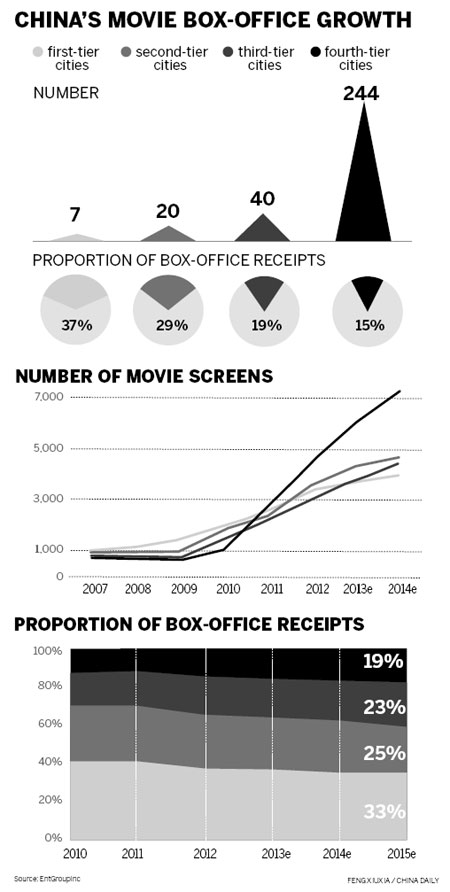Small cities play growing role in film market
According to a survey by EntGroup Consulting in 2012, 284 third- and fourth-tier cities accounted for 34 percent of the country's total ticket sales, while seven first-tier cities accounted for 37 percent of sales.
The company expects that 34 percent to rise to 42 percent by the end of 2015, given the gradual saturation of the cinema market in first- and second-tier cities.
The number of screens in fourth-tier cities first overtook those in first-tier cities in 2011, according to EntGroup.
As the number of screens and theaters continue to increase in third- and fourth-tier cities, Shen Zheyan, a cultural industry researcher with the Shenzhen-based CIC Industry Research Center, expects their share of the national market to continue rising, as incomes rise and more people move into cities.
China's urbanization rate — the proportion of people living in cities — passed 50 percent in 2011, and the government aims to lift that to 60 percent by 2020.
Panjin now boasts 40 screens against just 19 in 2011.
The rise in popularity of film in third- and fourth-tier cities has been boosted by big investment in digital technology, supported in part by the government and related administrations, according to industry insiders.
Central and local governments continue to offer subsidies in various forms to movie theater construction projects in county-level cities.
A number of provinces and municipalities have already converted all of their cinemas to digital technology, including Beijing, Shanghai, Shandong and Zhejiang provinces and Ningxia Hui autonomous region.
By the end of last year, there were 1,000 digital movie theaters with 3,000 screens in county-level cities, according to statistics from the film bureau.
In the first quarter of the year, there were 172 new cinemas established in country-level cities, accounting for almost 45 percent of the total number of new theaters nationwide.
Another 525 screens were added in those cities, about 30 percent of the total new screens installed across the country.
There were six cinema chains that generated more than 1 billion yuan in box-office revenues in 2012, including Wanda Cinema Line, Shanghai United Cinema Lines, and Dadi Digital Cinema.
Dadi's annual box-office performance increased 63.35 percent year-on-year last year, while the country's top two, Wanda Line and Shanghai United, increased 37.64 percent and 26.61 percent respectively, according to EntGroup figures.
Dadi Digital has primarily focused on developed townships and second- and third-tier cities in the Pearl River Delta and Yangtze River Delta areas since it was established in 2005.
In 2010, of its 92 cinemas, only one-quarter were in provincial capitals. It added 85 theaters last year, mostly being bought from other groups rather than being built, said Yang Shuting, an analyst from EntGroup.
"It has seen significant growth in just one year," she said.
 |

























